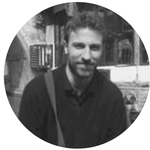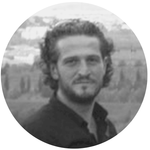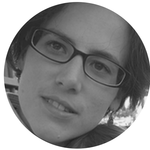
Erica D’Amico is an archeologist of the Middle Ages, recently moving towards an interest in Food History. She has been Adjunct Professor at the Richmond University in Rome since 2012, teaching a course titled History of Food and Table Manners, and a course on Medieval Rome. She has recently been selected as Core participant of the fellowship seminar program titled ‘Framing Medieval Mediterranean Art: museums and archeology in national discourse’ sponsored by the AAR and the Getty Foundation. She is also currently working with the University of Pisa as consultant at the Department of Civilizations and Forms of Knowledge. She has collaborated with the Ca’ Foscari University and the Professor of Medieval Archeology S. Gelichi in Venice. She holds a PhD in Archeology from Durham University (UK), completed in 2011. She has worked as an archeologist and pottery specialist in several projects in Italy and abroad and as a research assistant at the Center for Medieval Archeology of the Ca’ Foscari University in Venice since 2004.

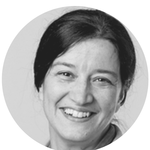 Laura Prosperi is a lecturer at the University of Adelaide within a program entirely devoted to Food Studies. As a food historian, Laura has explored a wide range of historical contexts privileging the food perspective. She gained her Ph.D at the European University Institute of Florence and she has also worked as a researcher in a range of other international environments such as the French École des Hautes Études en Sciences Sociales of Paris and the Institut für Europäische Geschichte in Germany. Before arriving at Adelaide, Laura taught Food History at the Faculty of Agriculture and Food Sciences of Milan and collaborated with other leading Italian universities such as Venice and Padua. Over the last fifteen years Laura has conducted research by focusing on the evolution of Western food culture and has written more than fifty pieces concerning the history of food.
Laura Prosperi is a lecturer at the University of Adelaide within a program entirely devoted to Food Studies. As a food historian, Laura has explored a wide range of historical contexts privileging the food perspective. She gained her Ph.D at the European University Institute of Florence and she has also worked as a researcher in a range of other international environments such as the French École des Hautes Études en Sciences Sociales of Paris and the Institut für Europäische Geschichte in Germany. Before arriving at Adelaide, Laura taught Food History at the Faculty of Agriculture and Food Sciences of Milan and collaborated with other leading Italian universities such as Venice and Padua. Over the last fifteen years Laura has conducted research by focusing on the evolution of Western food culture and has written more than fifty pieces concerning the history of food.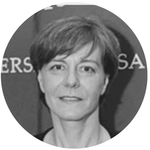
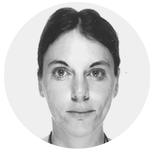 Francesca Coin is Assistant Professor of Sociology at Ca’ Foscari University of Venice, Italy. She received her Ph.D in Sociology from Georgia State University in 2007, with a dissertation entitled Pickles and Pickets after Nafta: Globalization and Agribusiness in the US and Mexico. She lived for several years in the United States and has travelled extensively through Asia and the Americas doing research in the rural communities of the peripheries in order to assess the impact of globalization on the food chain. Her work deals primarily with the sphere of reproduction, where she combines the tools of political economy and ethnography in order to study the impact of neoliberal policies on rural sustainability, always paying particular attention to issues of gender and race. She relocated to Italy in 2008. She currently teaches Neoliberal Policies and Intercultural Communication at Ca’ Foscari. She also teaches as a Visiting Professor at Ca’ Foscari Harvard Summer School and Venice International University.
Francesca Coin is Assistant Professor of Sociology at Ca’ Foscari University of Venice, Italy. She received her Ph.D in Sociology from Georgia State University in 2007, with a dissertation entitled Pickles and Pickets after Nafta: Globalization and Agribusiness in the US and Mexico. She lived for several years in the United States and has travelled extensively through Asia and the Americas doing research in the rural communities of the peripheries in order to assess the impact of globalization on the food chain. Her work deals primarily with the sphere of reproduction, where she combines the tools of political economy and ethnography in order to study the impact of neoliberal policies on rural sustainability, always paying particular attention to issues of gender and race. She relocated to Italy in 2008. She currently teaches Neoliberal Policies and Intercultural Communication at Ca’ Foscari. She also teaches as a Visiting Professor at Ca’ Foscari Harvard Summer School and Venice International University. DVM, Ph.D, associate Professor at the University of Perugia, Department of Veterinary Sciences. He is the director of the Master in Veterinary Public Health and Food Hygiene and a member of the External Review Working Group of the European Food Safety Authority (EFSA), Parma, Italy. Visiting professor at the University of Bristol, school of medical sciences, in 2002, at the University of California, Davis, USA, in 2007, and at the University of Pretoria, Onderstepoort, South Africa, in 2006 and 2009. He has a longstanding food hygiene and animal welfare expertise, and his technical skills include bacteriology, serology and molecular biology. Freelance writer for IT, designs web pages, creates computer software for office and artistic environments. Author of articles published in national and international peer- reviewed journals.
DVM, Ph.D, associate Professor at the University of Perugia, Department of Veterinary Sciences. He is the director of the Master in Veterinary Public Health and Food Hygiene and a member of the External Review Working Group of the European Food Safety Authority (EFSA), Parma, Italy. Visiting professor at the University of Bristol, school of medical sciences, in 2002, at the University of California, Davis, USA, in 2007, and at the University of Pretoria, Onderstepoort, South Africa, in 2006 and 2009. He has a longstanding food hygiene and animal welfare expertise, and his technical skills include bacteriology, serology and molecular biology. Freelance writer for IT, designs web pages, creates computer software for office and artistic environments. Author of articles published in national and international peer- reviewed journals.